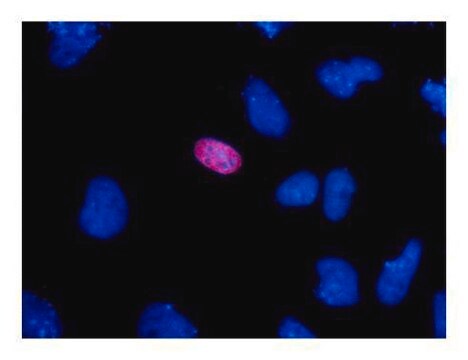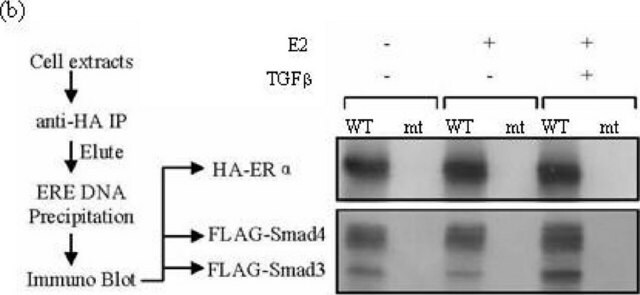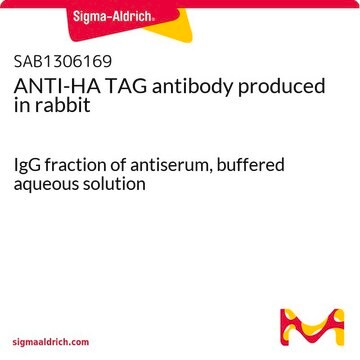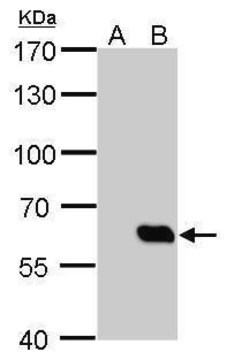05-902R
Anti-HA Tag Antibody, clone 114-2C-7, rabbit monoclonal
clone 114-2C-7, Upstate®, from rabbit
Sign Into View Organizational & Contract Pricing
All Photos(1)
About This Item
UNSPSC Code:
12352203
eCl@ss:
32160702
NACRES:
NA.43
Recommended Products
biological source
rabbit
Quality Level
antibody form
purified immunoglobulin
antibody product type
primary antibodies
clone
114-2C-7, monoclonal
species reactivity (predicted by homology)
all
manufacturer/tradename
Upstate®
technique(s)
western blot: suitable
isotype
IgG
shipped in
wet ice
target post-translational modification
unmodified
General description
Human influenza hemagglutinin (HA) is a surface glycoprotein required for the infectivity of the human virus. The HA tag is derived from the HA molecule that corresponds to amino acids 98-106. It has been extensively used as a general epitope tag in expression vectors. Many recombinant proteins have been engineered to express the HA tag, which does not appear to interfere with the bioactivity or the biodistribution of the recombinant protein. This tag facilitates the detection, isolation, and purification of the proteins. 05-902R is a recombinant version of the rabbit monoclonal Cat no. 05-902.
Specificity
The antibody recognizes recombinant proteins containing the HA epitope tag.
Immunogen
Synthetic peptide containing the sequence ...CYPYDVPDY... derived from the influenza virus hemaglutinin (HA) protein.
Application
Anti-HA Tag Antibody, clone 114-2C-7 detects level of HA Tag & has been published & validated for use in WB.
Research Category
Epitope Tags & General Use
Epitope Tags & General Use
Research Sub Category
Epitope Tags
Epitope Tags
Quality
Routinely evaluated by Western Blot HA-tagged WNT-1 transfected HEK293 cells.
Physical form
Format: Purified
Protein A purified
Protein A purified rabbit immunoglobulin in buffer containing 60mM Tris, 90 mM NaCl, 0.03% NaN3, 60mM glycine, pH 7.5, and 40% glycerol.
Storage and Stability
Maintain for 1 years at -20°C from date of shipment. Aliquot to avoid repeated freezing and thawing. For maximum recovery of product, centrifuge the original vial after thawing and prior to removing the cap.
Legal Information
UPSTATE is a registered trademark of Merck KGaA, Darmstadt, Germany
Disclaimer
Unless otherwise stated in our catalog or other company documentation accompanying the product(s), our products are intended for research use only and are not to be used for any other purpose, which includes but is not limited to, unauthorized commercial uses, in vitro diagnostic uses, ex vivo or in vivo therapeutic uses or any type of consumption or application to humans or animals.
Not finding the right product?
Try our Product Selector Tool.
Storage Class Code
12 - Non Combustible Liquids
WGK
WGK 1
Flash Point(F)
Not applicable
Flash Point(C)
Not applicable
Certificates of Analysis (COA)
Search for Certificates of Analysis (COA) by entering the products Lot/Batch Number. Lot and Batch Numbers can be found on a product’s label following the words ‘Lot’ or ‘Batch’.
Already Own This Product?
Find documentation for the products that you have recently purchased in the Document Library.
Customers Also Viewed
The CTPase activity of ParB determines the size and dynamics of prokaryotic DNA partition complexes.
Manuel Osorio-Valeriano et al.
Molecular cell, 81(19), 3992-4007 (2021-09-26)
ParB-like CTPases mediate the segregation of bacterial chromosomes and low-copy number plasmids. They act as DNA-sliding clamps that are loaded at parS motifs in the centromere of target DNA molecules and spread laterally to form large nucleoprotein complexes serving as
Anna Nordin et al.
Genome biology, 24(1), 185-185 (2023-08-11)
Cleavage Under Targets and Release Using Nuclease (CUT&RUN) is an increasingly popular technique to map genome-wide binding profiles of histone modifications, transcription factors, and co-factors. The ENCODE project and others have compiled blacklists for ChIP-seq which have been widely adopted:
Dario Zimmerli et al.
eLife, 9 (2020-08-19)
BCL9 and PYGO are β-catenin cofactors that enhance the transcription of Wnt target genes. They have been proposed as therapeutic targets to diminish Wnt signaling output in intestinal malignancies. Here we find that, in colorectal cancer cells and in developing
Rongkun Li et al.
Molecular cancer, 18(1), 18-18 (2019-02-02)
Lysyl oxidase-like 4 (LOXL4) has been found to be dysregulated in several human malignancies, including hepatocellular carcinoma (HCC). However, the role of LOXL4 in HCC progression remains largely unclear. In this study, we investigated the clinical significance and biological involvement
Jing Xu et al.
PloS one, 7(12), e52799-e52799 (2012-12-20)
Conjugation in Tetrahymena thermophila involves a developmental program consisting of three prezygotic nuclear divisions, pronuclear exchange and fusion, and postzygotic and exconjugant stages. The conjugation junction structure appears during the initiation of conjugation development, and disappears during the exconjugant stage.
Our team of scientists has experience in all areas of research including Life Science, Material Science, Chemical Synthesis, Chromatography, Analytical and many others.
Contact Technical Service












